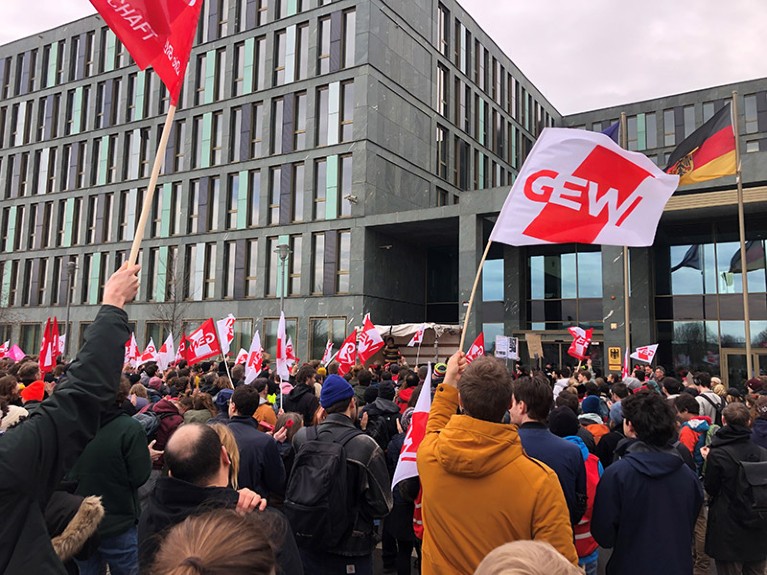Last week’s protest in Berlin was part of a long-running debate on a law about fixed-term contracts for researchers.Credit: Mike Cowburn (cowburn86)
Hundreds of researchers gathered in front of the German research ministry in Berlin on 24 March to demand improvements to working conditions in academia. The protest is the latest flashpoint in a long-running debate about a law that means postdocs can be employed on fixed-term contracts for only up to six years after they complete their PhD.
Lab leaders wrestle with paucity of postdocs
“This was the biggest protest we have ever managed to create,” says co-organizer Sandra Janssen, a member of the Network for Decent Labour in Academia, which coordinated the protest. As well as campaigning to abolish the Act on Fixed-Term Employment Contracts in Academia (WissZeitVG), the network is calling for the introduction of permanent contracts for postdocs and for the abolition of habilitation, a thesis-based qualification often required to become a professor.
In Germany, as in many countries, postdocs face tough competition for limited faculty positions. But those who can’t secure permanent jobs before the six-year limit might be forced to leave academia — or the country.
“Germany is losing a lot of great minds to other places,” says Igor Ogashawara, a postdoc in environmental science at the Leibniz Institute of Freshwater Ecology and Inland Fisheries in Berlin.
Deadline slashed
The protest was part of a backlash against a 17 March proposal by the research ministry to reduce the limit to three years. After two days of widespread criticism from the research community, the ministry said that it was withdrawing the draft bill. It went on to say that it would host a live-streamed open discussion on 30 March to inform the development of a revised draft. “We take this debate very seriously and will once again bring all stakeholders to the table,” a spokesperson for the German Federal Ministry for Education and Research told Nature.
The ministry has argued that without a limit on the postdoc phase, it would become more difficult for new generations of researchers to enter academia. It proposed the reduction after consulting stakeholders including universities and research institutions. But academics who spoke to Nature said that three years isn’t long enough to find a permanent position.
“Shortening the postdoc period as it was planned is suicidal to the system. No one gets into a competitive position within three years,” says Paula-Irene Villa Braslavsky, a professor in sociology and gender studies at the Ludwig Maximilian University of Munich. “I couldn’t have done it at all.” She started a petition opposing the proposed reform, which has received signatures from almost 2,800 professors at German institutions.
Postdocs under pressure: ‘Can I even do this any more?’
Ogashawara, who is originally from Brazil, says that the postdoc time limit makes things particularly difficult for researchers who aren’t German citizens, because applying for a visa and residence permit can be complex and time consuming. “We lose a lot of time, especially non-Europeans,” he says. “So, in the end, we do not have a lot of time to do our research.”
Janssen, a postdoc in comparative literature and the history of science at the Institute for Advanced Study in the Humanities Essen, says one problem is the lack of permanent positions available. She thinks that eliminating the WissZeitVG entirely would force research institutions to create more permanent positions, instead of continually hiring postdocs on fixed-term contracts with limited opportunities for career progression.
Villa Braslavsky says that the postdoc phase coincides with when many people start having children — as it did for her. The WissZeitVG allows extensions to the six-year limit for researchers who become parents or have a disability or chronic illness. But taking time out remains a disadvantage in terms of career progression, she says.
Brain drain
The time limit and lack of permanent positions also affects Villa Braslavsky as a principal investigator. “It is often difficult to retain excellent people,” she says. In a statement published online in response to the proposed reform, 24 academics who left Germany to pursue research careers in other countries warned of a “brain drain”.
Thomas Kirchner, a physicist at the Martin Luther University of Halle-Wittenberg who co-organized the Berlin protest, is among those considering leaving. “I have family in Germany, I have friends in Germany, I would like to stay in Germany, but if I’m on an open playing field and I don’t have these constraints, then I’m not choosing Germany. I mean, why would I?” he says.
Immediately after the protest, Kirchner says, the Network for Decent Labour in Academia received many requests for communication from the research ministry. “I think they heard us a little,” he says. But he isn’t optimistic about the open discussion on 30 March. “My biggest fear actually is that it will just result in a stalemate, so now nothing changes.”








More News
Author Correction: Bitter taste receptor activation by cholesterol and an intracellular tastant – Nature
Audio long read: How does ChatGPT ‘think’? Psychology and neuroscience crack open AI large language models
Ozempic keeps wowing: trial data show benefits for kidney disease